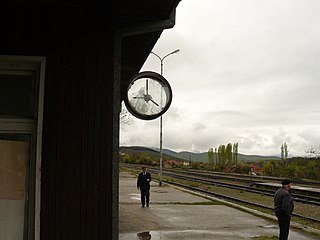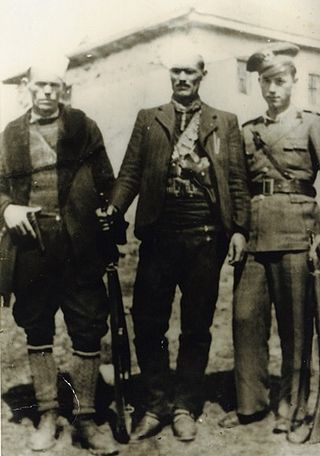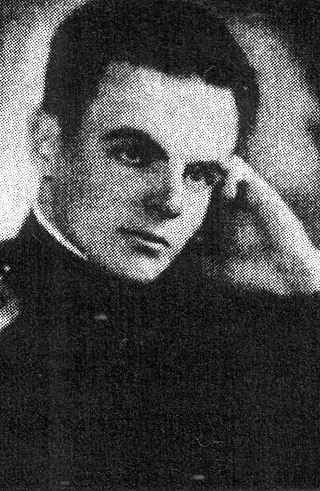Rexhep Jusufi | |
|---|---|
| Captain | |
| Personal details | |
| Born | Kalkandelen, Ottoman Empire |
| Died | 1943 Bukovici |
| Nationality | |
| Occupation | Soldier |
| Military service | |
| Allegiance | Balli Kombëtar |
Rexhep Jusufi was a captain of the Ballist Luboten Battalion in Vardar Macedonia.
Rexhep Jusufi | |
|---|---|
| Captain | |
| Personal details | |
| Born | Kalkandelen, Ottoman Empire |
| Died | 1943 Bukovici |
| Nationality | |
| Occupation | Soldier |
| Military service | |
| Allegiance | Balli Kombëtar |
Rexhep Jusufi was a captain of the Ballist Luboten Battalion in Vardar Macedonia.
Deralla was born in Kalkandelen, Ottoman Empire (present day Tetovo, North Macedonia). [1] [2] Jusufi studied at Rome and Padua before returning to Tetovo to join the Luboten Battalion.
When the Luboten Battalion was incorporated into the Balli Kombëtar, Jusufi joined the battalion as a captain and fought alongside Gajur Deralla. The battalion was successful against the Yugoslav partisans in Tetovo [3] [4] as Tetovo had the largest Balli Kombëtar base in Macedonia.
At the end of 1943, Rexhep Jusufi went along with Gajur Deralla and the Luboten division to Kicevo to help the Balli Kombëtar forces of Mefail Shehu against the Yugoslav partisans. [5] En route to Kičevo, partisan forces organised an ambush at Bukovici. Jusufi fell into the ambush at Bukovici which resulted in his death.

In Albania, World War II began with its invasion by Italy in April 1939. Fascist Italy set up Albania as its protectorate or puppet state. The resistance was largely carried out by Communist groups against the Italian and then German occupation in Albania. At first independent, the Communist groups united in the beginning of 1942, which ultimately led to the successful liberation of the country in 1944.
The Albanian National Front Party is a nationalist political party in Albania, Kosovo, and North Macedonia.

Tetovo is a city in the northwestern part of North Macedonia, built on the foothills of Šar Mountain and divided by the Pena River. The municipality of Tetovo covers an area of 1,080 km2 (417 sq mi) at 468 meters (1,535 ft) above sea level, with a population of 63,176. The city of Tetovo is the seat of Tetovo Municipality.

Kičevo is a city in the western part of North Macedonia, located in a valley in the south-eastern slopes of Mount Bistra, between the cities of Ohrid and Gostivar. The capital Skopje is 112 km away. The city of Kičevo is the seat of Kičevo Municipality.
The Balli Kombëtar was an Albanian nationalist, collaborationist, and anti-communist resistance movement during the Second World War. It was led by Ali Këlcyra and by Midhat Frashëri. The movement was formed by members from the landowning elite, liberal nationalists opposed to communism, and other sectors of society in Albania.

Zajas is a village in the municipality of Kičevo, North Macedonia. Zajas was the seat of the Zajas Municipality, and is now in Kičevo Municipality.

The German occupation of Albania occurred between 1943 and 1944 during World War II. Before the armistice between Italy and the Allied armed forces on 8 September 1943, Albania had been in a de jure personal union with and was de facto under the control of the Kingdom of Italy. After the armistice and the Italian exit from the Axis, German military forces entered Albania and it came under German occupation, creating the client-state, the Albanian Kingdom.

Xhemail Hasani, known as Xhem Hasa and Xhem Gostivari, was an Albanian nationalist and Axis collaborator, in charge of the Balli Kombëtar's activities in the western regions of Yugoslav Macedonia, a part of Yugoslavia occupied by Fascist Italy and Nazi Germany during World War II.

Skopska Crna Gora or Karadak Mountains, often called simply Crna Gora, is a mountain range and ethnographic region in North Macedonia, Kosovo and Serbia. The highest peak is Ramno 1,651 m (5,417 ft) in Macedonia. The largest town on the mountain is Kučevište in North Macedonia.

Mefail Shehu, also known as Mefaili i Madh or Mefail Zajazi, was a Balli Kombëtar military commander and leader of the Kicevo region during World War II. He was a close associate of Xhem Hasa.

The Committee for the National Defence of Kosovo was an Albanian organization founded in Shkodër on 1 May 1918. It was mainly consisted of the political exiles from Kosovo and was led by Hoxha Kadri from Pristina. It existed in looser form since May 1915.

Gajur Dëralla was captain of the Luboten Battalion. The Luboten Battalion was a military division of the Balli Kombëtar which operated in Albania under Fascist Italy and Nazi Germany.

The Black Society for Salvation was a secret Albanian nationalist society established in 1909. Its main task was to organize uprisings in southern Albania and Macedonia struggling for the unification of the four Ottoman vilayets with the substantial Albanian population into one autonomous political unit with its own government and parliament. The members of the society considered the armed rebellions as legitimate means for achieving their aims.

Islamic monuments in Kosovo are commonly related with the Ottoman arrival in 1389, and respectively with their effective establishment in Kosovo in 1459. However, many historical evidences show that the first encounters of Islam with the Balkans happened well before the arrival of the Ottomans and their establishment in the Balkans. Because of its proximity to the centers of Islam, i.e., Middle East, the Byzantine Empire and parts of the Balkans, including the Albanian territories and Kosovo as well, were exposed to Islam as early as in the 8th century.

Mullah Jakup Kardović was a Muslim cleric and during WWII a commander of a detachment of the Muslim militia in Rožaje, his native region. In November 1941, Kardović distinguished himself during the Battle for Novi Pazar, when he defended the city against the attacking Chetniks.

Llugaxhi is a village in Kosovo, located south of Lipjan.
The FirstBattle of Preševo or Battle of Eid al-Fitr was a battle fought on Eid al-Fitr, on 19 September 1944 during World War II, between Yugoslav Partisans and Balli Kombëtar forces, in the territory of the Kingdom of Bulgaria.